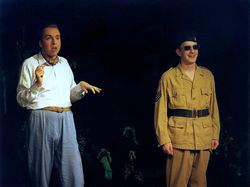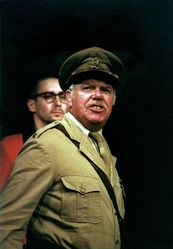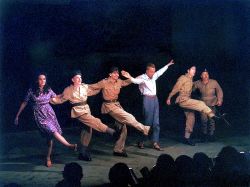Difference between revisions of "Privates on Parade (2002)"
(→Gallery) |
(→Gallery) |
||
| Line 76: | Line 76: | ||
Image: POP103a.jpg| | Image: POP103a.jpg| | ||
Image: POP104a.jpg| | Image: POP104a.jpg| | ||
| − | Image: | + | Image: POP105a.jpg |
| − | + | ||
</gallery> | </gallery> | ||
Latest revision as of 20:51, 1 August 2020

Music by Denis King
Directed by Elaine Heath
Performances: Sat 31st August - Sat 7th September 2002, Bell Theatre
Contents
Introduction
A subversive comedy about an army entertainment corps stationed in South East Asia in 1948, Privates on Parade charts the journey of young Steven Flowers, who is thrown into the Song and Dance Unit South East Asia, deep in the Malayan jungle. By evoking the great stars of the time, from Fred Astaire and Ginger Rogers to Carmen Miranda and Noël Coward, he achieves a spectacular rite of passage with a little help from the outrageous Captain Terri Dennis.
Peter Nichols's 1977 revue-style portrait of Army life, set in 1940s Malaya and documenting the frenetically sexual, mostly gay, often desperate antics of a song-and-dance unit, attached, as one soldier drawls, to 'the Queen's Own Middlesex Regiment'.
The show has eleven musical numbers, most of them pastiches of styles of the day, such as "Could you please inform us how we came to lose the war" a homage to Noël Coward, and "Sunnyside Lane" a Flanagan and Allen number.
The play is largely based on Nicols's own post-wartime experiences as a member of C.S.E or Combined Services Entertainments, where he shared a stage with none other than John Schlesinger, Stanley Baxter and Kenneth Williams. The outfit, under command of "stiff-upper-lip" Major Giles Flack, is a performance unit called SADUESA: Song and Dance Unit, South-East Asia. The company is also under the command of an outlandish theatrical queen, Dennis. Together, the unlikely duo of Flack and Dennis have to prepare the troupe for the tour of the war zone. They are accompanied by a psychotic sergeant-major, who's involved in selling arms to rebels; and a young officer, recently transfered from the Intelligence Corps.
Cast
- Major Giles Flack - Alan Jarvis
- Acting Captain Terri Dennis - Joe St Johanser
- Sergeant Major Reg Drummond - Bob Callender
- Sylvia Morgan - Elinor Morgan-Jones
- Flight Sergeant Kevin Cartwright - Joe Williams
- Corporal Len Bonny - Richard Watkins
- Lance Corporal Charles Bishop - Stuart Flitton
- Leading Aircraftman Eric Young-Love - Andrew Nussbahm
- Private Steven Flowers - Simon Holland
- Lee - Mark Davies
- Cheng - Ying Chan
Crew
- Musical Director - Alan Walker
- Choreographer - Anna York
- P.A. - Marian Buss
- Stage Managers - Jess Osorio & Pat Laban
- Lighting Design - Mike Elliott
- Lighting Operator - Sarah Farage
- Sound Design - Andrew Rickinson with assistance from Christopher Vian-Smith, Brian Fretwell & Elaine Heath
- Sound Operator - Brian Fretwell
- Set Design - Adam O'Riley
- Set Construction - Adam O'Riley, Daniel McConnon, Bob Callender, Stuart Flitton, Bernie Bullbrook, Jess Osorio & Anton Krause
- Prompt - Marian Buss
- Military Advisor and Drill Tutor - Peter Fortune
- Stunt Co-ordinator - Clive Russell
- Wardrobe - Val Williams, Shirley Heath & Flame Torbay Costume Hire
- Dresser - Phillipe
- Wig Master & Hair Stylist - Jay Michaels
- Make-up - Elaine Heath
Reviews
From the Croydon Advertiser.
Peter Nichol's play is about a song and dance unit in Malaysia following the Second World War. Cue the inevitable comparison with the TV sitcom It Ain't 'Alf Hot Mum which this production cleverly acknowledges at one point by playing its signature tune offstage.
SADUSEA (Song And Dance Unit South East Asia), under the command of the blimpish Major Flack, is like Fred Karno's army with a gay flavour, acting Captain Terri Dennis being its resident queen. It is based on Nichols's own Far East experience in the Combined Services along such comic luminaries as Kenneth Williams and Stanley Baxter.
The ambience is captured with a good deal of flair in Elaine Heath's spirited production. The life and soul of the party is Joe St Johanser's busy, fussy Terri Denis, about whom my only criticism would be its superabundance of camp. Very funny, even inspired, yet I think it could make its point with just a modicum of restraint.
There is not much restraint about Alan Jarvis as the bristling Major Flack. And quite right too, for he paints a flawless picture of the dim, fanatical, God-fearing British officer at his best, or worst; an arrow shot with deadly accuracy.
Simon Holland is Private Steven Flowers, probably the author himself, the wide-eyed innocent who brings a bit of culture into the proceedings. Elinor Morgan-Jones is the Welsh-English girl responsible for his rite of passage: a true and sincere performance though needing a touch of the brake, a bit of space and time between the words, in the interest of better audibility.
The rest are mainly "types" generally played with much panache, especially Bob Callendar as the unpleasant sergeant-major, and Richard Watkins as the thick, hard-swearing, genial Brummie, Len Bonny, whose death in action comes as a shock amidst the prancing proceedings.
Donald Madgwick
Gallery
Reminiscences and Anecdotes
Members are encouraged to write about their experiences of working on or seeing this production. Please leave your name. Anonymous entries may be deleted.
See Also
Have there been other SLT/SLTC productions of this play? Link to them here.
Or add anything that is related within this site. The author's page for instance or other plays with a similar theme.
References
<references/>


